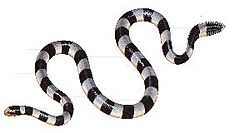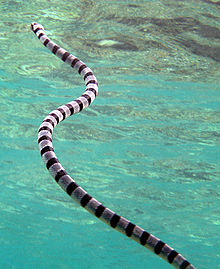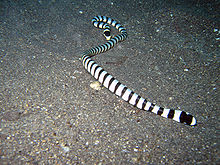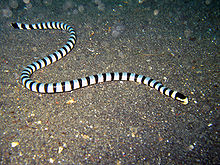- Laticauda colubrina
-
Laticauda colubrina 
Conservation status Scientific classification Kingdom: Animalia Phylum: Chordata Class: Reptilia Order: Squamata Suborder: Serpentes Family: Hydrophiidae or Elapidae Genus: Laticauda Species: L. colubrina Binomial name Laticauda colubrina
(Schneider, 1799)Synonyms Hydrus colubrinus Schneider, 1799
Platurus colubrinus Girard, 1858The colubrine sea krait, banded sea krait or yellow-lipped sea krait (Laticauda colubrina) is a species of sea snake found in tropical Indo-Pacific oceanic waters.
Contents
Description
- See snake scales for terms used
Ventrals large, one-third to more than half the width of the body; nostrils lateral; nasals separated by internasals; 21-25 longitudinal rows of imbricate scales at midbody; an azygous prefrontal shield usually present; rostral undivided;
Body subcylindrical, only slightly compressed. Rostral higher than broad; an azygous shield separating the prefrontals, sometimes absent; frontal considerably longer than its distance from the end of the snout; 1 pre- and 2 post oculars ; 7-8 supralabials, the 3rd-4th touching the eye temporals 1+2 ; five infralabials in contact with the genials, both pairs of which are usually well developed and in contact with one another, the anterior pair smaller than the posterior ; a double series of elongated scales, the inner series the larger, at the oral margin. Scales in 21-23 rows (rarely 25). Ventrals 213 to 245, about four times as long as broad. Caudals in males 37-47, females 29-35 (Smith 1943:443).
Total length: males 875 mm, females 1420 mm; tail length: males 130 mm, females 145 mm. In colour these snakes are light or dark bluish grey above, yellowish below, with black bands more or less of uniform width throughout or narrowing on the belly (some of them interrupted below). Upper lip yellow. Snout yellow, the colour extending backward on each side of the head on each side of the head above the eye as far as the temporal shields, leaving a dark bar in between. Rest of the head is black.
They are venomous but are not aggressive to divers.
Biology
Banded sea kraits are often seen in large numbers in the company of hunting parties of Giant trevally (Caranx ignobilis) and Goatfish. These snakes need to drink freshwater and regularly come onto land
Observation and nesting
Banded sea kraits rest and nest on rocky headlands and beaches of Sabah, Borneo. They can be seen in the wild at Pulau Tiga, the tip of Borneo and Mabul island. They are, however, seen on a many other rocky headlands around Sabah that are harder to access. Occasionally they come ashore at Tanjung aru close to Kota Kinabalu. They can be seen in captivity at The Green Connection, an aquarium in Kota KInabalu. The males come ashore early in the evening and wait at the high tide line for the females. Females are much larger and many males will escort and intertwine around a single female. They are also seen on Kadavu Island in Fiji and can often be found in the shallows whilst snorkelling. A specimen identified as a banded sea krait was seen on a small island off Padre Burgos, Luzon, Philippines, in November 2010. Locals familiar with the island say the snakes are most frequently found in crevices in the rock by day and roaming the beach and nearby waters after dark. This kind of snake has been seen also in beach in island of Boracay, Philippines.
Parasites
Banded sea kraits when collected near the tip of Borneo had heavy tick infections (Clark M & S Oakley,2011)
See also
- Blue-lipped sea krait
- Yellow-bellied sea snake
- sea snake
References
- Frith,C.B. 1974 Second record of the seasnake Laticauda colubrina in Thailand waters. Nat. Hist. Bull. Siam Soc. (Bangkok) 25: 209
- Ota, Hidetoshi;Takahashi, Hiroshi;Kamezaki, Naoki 1985 On specimens of yellow lipped sea krait Laticauda colubrina from the Yaeyama group, Ryūkyū Archipelago Snake 17: 156-159
- Pernetta, J. C. 1977 Observations on the habits and morphology of the sea snake Laticauda colubrina (Schneider) in Fiji Canadian Journal of Zoology 55: 1612-1619
- Shetty, Sohan;Devi Prasad, K. V. 1996 Geographic variation in the number of bands in Laticauda colubrina Hamadryad 21: 44-45
- Shetty, S. & Shine, R. 2002 The mating system of Yellow-lipped sea kraits (Laticauda colubrina: Laticaudidae). Herpetologica 58 (2): 170-180
- Shetty, S. & Shine, R. 2002 Sexual divergence in diets and morphology in Fijian sea snakes Laticauda colubrina (Laticaudinae). Austral Ecology 27: 77-84
- Voris, Harold K.;Voris, Helen H. 1999 Commuting on the tropical tides: the life of the yellow-lipped sea krait Laticauda colubrina Reptilia (GB) (6): 23-30
- Rasmussen, Arne R.; Elmberg, Johan. 2009 'Head for my tail': a new hypothesis to explain how venomous sea snakes avoid becoming prey. Marine Ecology (in the press, August 2009, abstract at: http://www3.interscience.wiley.com/journal/122540095/abstract; Popular account at: http://news.bbc.co.uk/1/hi/sci/tech/8184364.stm)
- Clark M & S Oakley (2011) Tick parasites on the sea snake Laticauda colubrina. Popular account at: http://tracc-borneo.org/2011/03/sea-snake-parasites-1/, referenced May 2011.
Categories:- IUCN Red List least concern species
- Sea snakes
- Reptiles of the Philippines
- Reptiles of Japan
Wikimedia Foundation. 2010.




